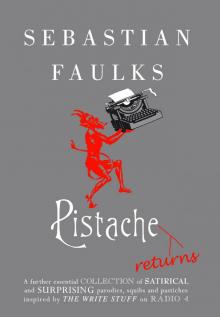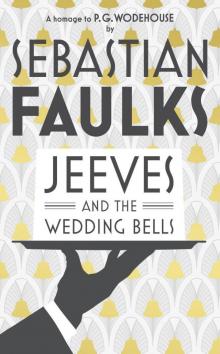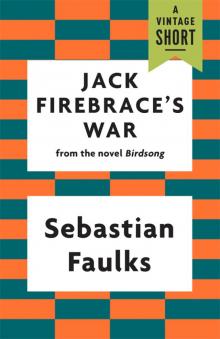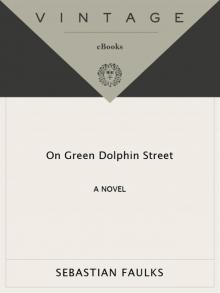- Home
- Sebastian Faulks
A Week in December Page 39
A Week in December Read online
Page 39
Surely, though, the promises that God had made through the Angel Gabriel and whispered in the Prophet’s ear, the assurances of paradise, would take into account all that he must forgo. It was written. ‘God will not deny the faithful their reward.’
Hassan clicked shut the window, selected ‘wipe personal history’ (not that it much mattered now) from the drop-down menu and turned off the computer.
His parents had left for the Toppings’ dinner party.
He called a minicab to take him to Upminster station. ‘Aye, twenty minutes’ll do just fine.’
While he waited, he flicked through an old copy of The Toad.
II
Gabriel Northwood emerged from the Tube and looked at the local map near the station exit. As he walked the three blocks to the Toppings’ house, he could see the other guests converge by car. The al-Rashids’ chutney-coloured limousine drew up outside the front door and double-parked, hazard lights blinking, while Joe held the door for his employers. The Vealses’ four-wheel-drive off-roader just beat Spike Borowski to the best remaining parking place on the other side of the street. Impoverished Clare Darnley had arrived half an hour early by one of the six articulated buses she’d found waiting empty, throbbing, pumping fumes into the air of Shepherd’s Bush.
On the hall table inside, Gabriel saw the pile of unwanted offerings that would be recycled through Sophiee’s compendious ‘present drawer’. Spike Borowski had brought the only thing that would be used: a football signed by his teammates for Jake, the Toppings’ eleven-year-old son.
Gabriel followed a caterer upstairs to the sitting room. To his relief, he remembered Sophie Topping when she greeted him with a kiss on the cheek. Her skin snagged a fraction on his as she withdrew, and he wished he hadn’t economised on razor blades.
A tray of fizzing flutes was offered to him and he took one, holding it by the base.
‘Now then,’ said Sophie. ‘You’re not to talk to Nasim because you’re sitting next to her at dinner. Clare Darnley’s on your other side, so you’re not to talk to her either ...’
Allowing himself to be led by the arm, Gabriel caught the elbow of a waiter and hungrily took a classy-looking canapé; only as he swallowed did he recognise it as raw fish. Something about Gabriel’s appearance made other people talkative. He had never understood what it was, but women stood close and confided in him; men prodded him in the chest as they explained their triumphs. Both sexes seemed anxious to inform him, to keep him in some all-important loop. Perhaps there was something in his eyes, he thought misanthropically, that they mistook for sympathy.
He overheard, at that moment, a man with a face like a fox terrier and a reedy voice: ‘It’s hard to know which is more baffling, the sales or the critical acclaim.’
A pace or two away from him was an exuberant, paunchy fellow in his forties, saying: ‘In six months Digitime is going to offer you the complete service – television, broadband – the whole kit and caboodle. We won’t just be a programme maker but a full service provider. We’ve gone into business with an ISP and one of the old franchise holders. You’ll be able to tailor-make your own package through opt-ins, then vary it online each month at no extra cost ...’
Despite the nature of what he was saying, Gabriel thought, the man sounded like a wing commander from an old war film.
A demure woman in a grey woollen dress squared up to him: ‘So, will I still get the BBC?’
‘Of course, if you opt in,’ said the wing co. ‘But not as a default.’
A regal, brown-skinned woman, Indian probably, interrupted: ‘What Simon isn’t telling you – are you, darling? – is that the only free programmes, the only defaults in his packages, are pornography he’s bought from Richard Branson.’
The demure woman: ‘So if I don’t upgrade my package, I can only get pornography?’
The wing co: ‘Public service broadcasting – all those gorillas, heritage and news analysis stuff – that’s increasingly niche. So you would expect to pay for that, yes.’
‘So it’s a porn package,’ said the woman, growing steely, ‘with respectable add-ons as options?’
‘We already have a ten per cent market share,’ said the wing co – or the television magnate Simon Porterfield, as Gabriel now deduced him to be. ‘À la carte viewing is the future of tele—’
‘But it’s just a porn package,’ said the woman, ‘which I—’
‘Not just that. The starter pack, which is only a few pennies a month, includes all our big hit shows for Channel 7. It’s Madness, for instance, which is pulling six million viewers on 7 even as we speak ...’
‘But that’s a catastrophe,’ said the woman. ‘It’s a disgusting programme and somebody took his life on it two days ago.’
‘It’s far from catastrophic,’ said Simon Porterfield. ‘It’s more or less single-handedly kept Channel 7 afloat.’
‘Better to have let it sink. And what about this poor man who killed himself?’
‘It was very unfortunate, I admit. But I think in the long term, in the history of television it’ll be remembered as ...’ Simon Porterfield looked round for a moment, as though searching for the perfect word, then beamed in triumph, like a retriever dropping a prized bird at its master’s feet. ‘Iconic,’ he said.
Gabriel moved on past a small man with unblinking eyes and shiny skin, whom he had overheard being introduced as John Veals: ‘Yes, we dropped six bar on that one but we’d made it up by the end of the week. That’s life.’
‘Bar?’
‘Million.’
‘Million?’
‘Yes. UK.’
‘Isn’t that rather a lot?’
‘It’s not nothing. But this is not the fucking soft-toy business.’
And behind him, in the window, was an eager-to-please man Gabriel recognised as the Leader of the Opposition. He was leaning towards a slender woman in a green sheath dress: ‘That’s exactly right,’ he was saying. ‘What we have to fight against is the low expectation of so many parents. It’s no good just getting little Johnny ... or, er ... Joanna—’
‘Or Wazir.’
‘Especially not Wazir, no use getting any of them through with half a dozen meaningless exam passes. We have to raise the bar. Raise the standards all round ...’
The removal of all the furniture meant the guests could move freely without falling over chairs and tables, but unfortunately the empty room had developed an echo that made it difficult for people to hear unless they bellowed or stood close.
Gabriel noticed a small man with a dandruffy collar he thought he had heard introduced as ‘Len’ leaning close to make himself heard. He saw the Indian princess, presumably Mrs Porterfield, politely lower her head towards him, then recoil.
Olya was holding tight to Spikee’s arm. Spike stood with his back to the fireplace, in which a superfluous log fire raged. He wore a new white shirt, designer jeans and expensive black suede trainers. He looked younger than the other guests, exotic, aglow with vascular well-being and recent sex. His lightly gelled hair, black and curly, and his unmarked dermis made the others look old and defeated, their eyes red from staring at computer screens, their skin shining only from applications of expensive snake oil, said to rejuvenate.
Spike was talking to Roger Malpasse, who was in some difficulty – fascinated by what Spike could tell him about the Premier League, but unable to keep his eyes from Olya, so much of whom was revealed by her sleeveless, almost (it seemed to Roger) topless, yet at the same time curiously demure dress in deep red satin.
‘This thin person is your wife?’ said Spike, pointing towards Amanda in her emerald sheath.
‘Yes, yes, that’s her all right. So, now, what do you reckon? Man United. Think you’ll beat them?’
Roger had had a crafty second primer (technically almost a zonker) before leaving home, and he felt bold.
‘Man U is a very good football team,’ said Spike. ‘I learn much when young from the celebrated quartet – Beckham the stylis
h icon, Keane, the Hibernian man of war, Scholes in the hole and Giggs, the wizard of dribble.’
Roger laughed. ‘Me too. I have some dogs at home called after them. Well Beckham, Scholes and Butt anyway. Butt’s a lurcher.’
A frozen egg-timer appeared above the links of interbabel.com in Spikee’s mind. Lurcher? Lurch: v stumble, walk unsteadily ...
‘Why you call your dog Butt?’ said Spike.
‘Because I didn’t want to call him And,’ laughed Roger Malpasse. ‘No, no, just kidding. Should’ve called the bugger Rooney. Bloody ugly enough.’
‘I think you like dogs?’ Spike said.
‘Oh yes. We have six. Amanda’s got two whippets and a pug. We’ve brought them to London.’
Whip it? Pug? ... This was impossible. ‘I like dogs,’ said Spike. ‘My bitch is in doghouse waiting to come into England. She is four years old. Bernese Mountain bitch.’
‘Ah I see,’ said Roger. ‘Thought you meant ... Careful now. I see the other half making her way over.’
Spike glanced over to where Amanda was coming to talk to them.
‘Other half ... What? I see. Very beautiful person.’
‘Yes, that’s no dog,’ said Roger, on a roll. ‘That’s my wife.’
‘Tad,’ said Olya. ‘There is man over there who is looking at me in strange way.’
‘Which one?’
Olya pointed.
‘Who is that man?’ said Spike.
‘That one?’ said Roger. ‘That’s John Veals. The hedge-fund manager. He looks at everyone in a strange way. I wouldn’t let it worry you. Look, here come the drinks again.’
Patrick Warrender arrived late, and, after having made his apologies to Sophie, went in search of R. Tranter, whom he found quite easy to detach from a group that included John Veals.
‘I’ve got something for you, Ralph.’ Patrick took his elbow and guided him through the door and on to the landing, where he withdrew an envelope from his inside pocket. ‘I hope you’ll like it. Open it now if you want.’
‘What is it?’ Tranter’s first response was to fear that he was being fired from his never-ratified position as a reviewer for Patrick’s newspaper.
Patrick smiled. ‘Go on. It won’t bite. Open it. I had Arabella on the Sunday paper type it up this afternoon. I went in specially.’
With his hands shaking a little, Tranter ripped open the envelope. It appeared to be an offer of work: a formal monthly retainer for his services. His eyes went rapidly down the page till they snagged on the crucial detail: £25,000 a year.
He tried to conceal his amazement. ‘Looks fine. Thanks. But why now? I wasn’t expecting anything. I was happy with the arrangement we had.’
‘I know,’ said Patrick. ‘I just thought it might make up for your disappointment with the Pizza Topping thing.’
‘Pizza Palace, you mean.’
‘Pizza Whatever.’ Patrick laughed. ‘I seem to have elided two evenings there. You’ll see that we’re offering to pay you monthly in return for three reviews a month. If there aren’t three suitable books, you just keep the money. If for some reason you do more, then you’re paid pro rata.’
‘Sounds fine.’
‘Just one thing, Ralph.’ Patrick was walking round the landing with his hands behind his back, like a headmaster explaining something to a favoured pupil. ‘From now on, you can only write about the nineteenth century.’
‘What?’ Tranter was suspicious again.
‘No more stuff about today.’ Patrick coughed. ‘It’s not really your thing, is it? But biographies, letters, poetry, travel, anything from long before you were born, that should be all right, shouldn’t it? I mean, be honest, Ralph, the work of your contemporaries is ... It’s an affliction to you, isn’t it?’
Tranter looked down. He had the strange feeling that his life had reached a turning point. What was even odder, he thought, was that he should be aware of it as it was happening; normally such things were clear only in retrospect. But he was light-headed with relief and financial exhilaration: £47,500 a year had fallen into his lap in little more than thirty-six hours. Who cared about the Pizza Palace any more? The giddiness tempted him into honesty. This was not a response he knew well, so he trod carefully.
‘Well,’ he said. ‘I, er ... I think you may be right.’ He stopped to see if the ceiling would fall in or if Patrick would laugh, but nothing happened. Tranter felt emboldened to go further. ‘The truth is,’ he said, ‘I can’t bear contemporary stuff. Excuse me a moment. I just need to get some air.’
Tranter went abruptly downstairs to the hall, down again to the kitchen, bypassing a number of caterers hard at work, then opened the French doors on to the patio, where the chef was having a cigarette, and went past him on to the lawn.
He sat down on a knee-high brick border wall at the end of the garden, struggling with his turbulent emotions. Almost £50,000 a year to live only in the nineteenth century ... What joy, what fun, what larks! Perhaps he’d get another cat, some company for Septimus. He’d go on holiday, he’d accept that trip they’d offered him, to lecture on a cruise ship in the Baltic. ‘Trollope: the Writers’ Writer’; ‘Alfred Huntley Edgerton: the Unknown Victorian.’
No more Sedley, no more Oirish Twaddle, no more the poor man’s Somerset Maugham with his embarrassing improbabilities at key moments. No more the higher bogus, Pym and water, the busted flush and the woman who wrote by numbers ... From now on, just Browning and Thackeray and Edgerton, George Gissing and dear old William Harrison Ainsworth.
He kicked the last of the autumn’s leaves with the toe of his brown shoe and dashed his sleeve across his damp cheek. In a minute, he’d go back inside and face all those sneery people with the fire of forty-five grand in his belly.
Upstairs, Nasim al-Rashid was talking to someone called Mark Loader. He was under the impression that she had recently arrived from the other side of the world, and she hadn’t the heart to tell him she was from Bradford.
‘And do you like it here?’ he said, looking candidly over her shoulder for someone more interesting.
‘In London?’
‘Yes.’
‘We haven’t been here long. But yes, I do.’
‘Very big. Crowded,’ Loader said, his eyes still roving in search of a native. ‘Many people in London,’ he added loudly.
‘Yes indeed. But we live just outside town. At Havering-atte-Bower.’
‘Where’s that?’
‘On the way to Ipswich,’ said Nasim.
‘Oh, I see,’ said Mark Loader.
‘Are you a politician, too?’ said Nasim. ‘Like Lance?’
‘God, no.’
Since Loader offered no more, Nasim continued. ‘So what is it you do?’
‘I’m a mathematician.’ The way he pronounced it made it sound like ‘methemetician’. He seemed very pleased by his calling.
Nasim smiled. ‘I used to love maths at school. It was my favourite subject. Where do you teach?’
‘I don’t teach.’ Loader looked as though he’d been accused of a minor but disgusting offence. ‘I run a fund.’
‘What are you raising money for?’
Loader’s face creased with impatience, then relaxed, as though he had decided to give the wetback one more chance. ‘To be precise,’ he said, ‘I run a fund of funds.’
‘A fund of ...?’
‘I’ve been very lucky.’ Loader took a passing canapé and focussed briefly on Nasim. ‘I worked for an old mate in a hedge fund for some years. I did the heavy lifting. The analysis. Then we had an offer we couldn’t really refuse from one of the American banks. So we sold it. Johnny’s still a consultant. So I sort of retired.’ Mark Loader took a sip of his drink. ‘But I was only thirty-six. And after a couple of years, I got rather bored. You know. Had the Georgian rectory, swimming pool, blah blah.’
‘So what did you do?’ said Nasim.
‘Well, me and a couple of mates started a fund. Or to be precise, a fund of funds. You know, some p
eople think hedge funds lose their touch after a short while. Style drift. So you want to keep moving. Even the best hedgie can’t really cover all the bases. So it’s quite usual to have money in a fund of several different funds. It’s an obvious way of maximising your profit. Keeping fresh.’
‘I see,’ said Nasim.
‘It’s just a little thing,’ said Loader. ‘Very few investors. But it keeps me out of mischief. I do a couple of days a week on it. I’ve been awfully lucky.’
Gabriel was standing next to them. He introduced himself.
‘Oh dear,’ he said, when Nasim told him who she was. ‘Sophie told me I was not to talk to you because I’m sitting next to you at dinner.’
Nasim smiled. ‘Perhaps you should talk to Mr Loader, then. He was telling me that he runs a fund of funds.’
‘Really?’ said Gabriel. ‘What’s that?’
‘I’m just going to have a word with our host,’ said Loader. ‘Excuse me.’
‘It’s a way of keeping fresh,’ said Nasim. ‘Of avoiding style drift. Do you have money in a fund of funds?’
‘I keep all my wealth there,’ said Gabriel. ‘Mad not to. But I’m thinking of moving it to a fund of funds of funds.’
Loader lingered for a moment as Sophie Topping joined them. ‘You can laugh as much as you like,’ Loader said. ‘But if you were in work between 1986 and 2006 and you failed to bank fifty million, then your children are going to wonder whether you bothered to get out of bed. There’s never been a time like it and there never will be again. Even al-Qaeda couldn’t derail it. Look over there. That’s Jamie “Dobbo” McPherson. He was at school with me. Left with two exam passes, and one of those was in woodwork. Even Dobbo made it in the end. God knows, we thought he’d never manage it. But finally, finally, he flogged his share in Café Bravo, then made a pile in commercial property. Christ, he even made money backing films for heaven’s sake! He’s made north of a hundred million. And if you haven’t, your children and grand-children are going to want to know why.’

 Devil May Care
Devil May Care Pistache Returns
Pistache Returns The Girl at the Lion D'Or
The Girl at the Lion D'Or Pistache
Pistache Jeeves and the Wedding Bells
Jeeves and the Wedding Bells A Week in December
A Week in December The Vintage Book of War Stories
The Vintage Book of War Stories Engleby
Engleby Birdsong
Birdsong Jack Firebrace's War
Jack Firebrace's War Where My Heart Used to Beat
Where My Heart Used to Beat A Possible Life
A Possible Life The Fatal Englishman: Three Short Lives
The Fatal Englishman: Three Short Lives On Green Dolphin Street
On Green Dolphin Street Charlotte Gray
Charlotte Gray A Broken World: Letters, Diaries and Memories of the Great War
A Broken World: Letters, Diaries and Memories of the Great War Human Traces
Human Traces The Fatal Englishman
The Fatal Englishman A Broken World
A Broken World Paris Echo
Paris Echo War Stories
War Stories Girl At the Lion d'Or
Girl At the Lion d'Or